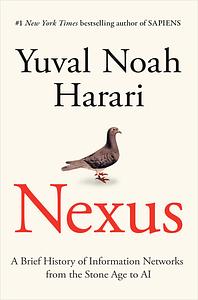Take a photo of a barcode or cover
1.03k reviews for:
Nexus: A Brief History of Information Networks from the Stone Age to AI
Yuval Noah Harari
1.03k reviews for:
Nexus: A Brief History of Information Networks from the Stone Age to AI
Yuval Noah Harari
informative
inspiring
reflective
medium-paced
informative
medium-paced
informative
reflective
informative
reflective
medium-paced
it made me think a lot on what humanity means in the imminent future of AI being the most powerful invention in information technology. it is important to have sound independent thinking with empathy and make good decisions everyday, no matter how small the choices may seem.
challenging
informative
reflective
medium-paced
informative
reflective
slow-paced
Harari's newest book feels both urgent and almost already out of date - the speed at which things are moving in the fields of computing, AI, and politics are makes a broad-view history liable to be superceded by real-world developments in a short time.
However, his message - or warning - is clear. We should, as a species, be extremely careful when unleashing powers we do not know how to control. Using his now characteristic extreme wide-focus on the development of human societies, he examines how networks have been built and exploited by humans, often with far-ranging consequences well beyond the initial conception of a new technology. The watchword here might be 'unintended consequences', with great illustrations of how previous developments - the written word, mass printing, industrialization, and computing - have all led to radical reimaginings of human societies, with effects felt on a vast scale.
Often, these developments have enabled both great progress and great tyranny, in Harari's view, which seems like a fair conclusion. However, the spectre of AI - termed 'alien intelligence' here - threatens to unleash a revolution far beyond the scope of these previous technological paradigm shifts. There is obvious real danger here, but what makes it even more pressing is the sheer scale and unpredictability of the unknowns. Some of the potentially disastrous scenarios outlined are indeed terrifying.
This central message is well-argued, albeit speculative, and is definitely something we should be very concerned about as a species. Solutions are thin on the ground, though, with little more than exhortations to work together and be very strict about how and when we use AI. I'd expected more practical guidance, and I do hope that Harari uses his platform as public intellectual to work for meaningful change and regulation, both from governments and tech companies. Overall, as a book, it felt like the idea could easily have been compressed into something half the length, or even shorter - perhaps a long-read article. There's a lot of repetition, and the final sections feel more like padding than insight. Well worth reading, even if you skim some of it. The next steps, however, are where the real importance lies, and one is left with the feeling that - for tech doom-mongers at least - things are already moving too fast, and Pandora's digital box has been irreversibly opened.
However, his message - or warning - is clear. We should, as a species, be extremely careful when unleashing powers we do not know how to control. Using his now characteristic extreme wide-focus on the development of human societies, he examines how networks have been built and exploited by humans, often with far-ranging consequences well beyond the initial conception of a new technology. The watchword here might be 'unintended consequences', with great illustrations of how previous developments - the written word, mass printing, industrialization, and computing - have all led to radical reimaginings of human societies, with effects felt on a vast scale.
Often, these developments have enabled both great progress and great tyranny, in Harari's view, which seems like a fair conclusion. However, the spectre of AI - termed 'alien intelligence' here - threatens to unleash a revolution far beyond the scope of these previous technological paradigm shifts. There is obvious real danger here, but what makes it even more pressing is the sheer scale and unpredictability of the unknowns. Some of the potentially disastrous scenarios outlined are indeed terrifying.
This central message is well-argued, albeit speculative, and is definitely something we should be very concerned about as a species. Solutions are thin on the ground, though, with little more than exhortations to work together and be very strict about how and when we use AI. I'd expected more practical guidance, and I do hope that Harari uses his platform as public intellectual to work for meaningful change and regulation, both from governments and tech companies. Overall, as a book, it felt like the idea could easily have been compressed into something half the length, or even shorter - perhaps a long-read article. There's a lot of repetition, and the final sections feel more like padding than insight. Well worth reading, even if you skim some of it. The next steps, however, are where the real importance lies, and one is left with the feeling that - for tech doom-mongers at least - things are already moving too fast, and Pandora's digital box has been irreversibly opened.
reflective
slow-paced
eh, skip the first half. this man wouldn't know what information studies was if it came up and shushed him.
Due back at library. I think I got most of what I would have gotten out of this.
এই বইয়ের রিভিউ লিখতে গেলে আর একটা বই লিখতে বসতে হবে। আপাতত বই লেখার টাইম নাই। তবে উল্লেখযোগ্য অংশগুলো আরো কিছু কম্পাইল করে পরে দেব ক্ষণ।



